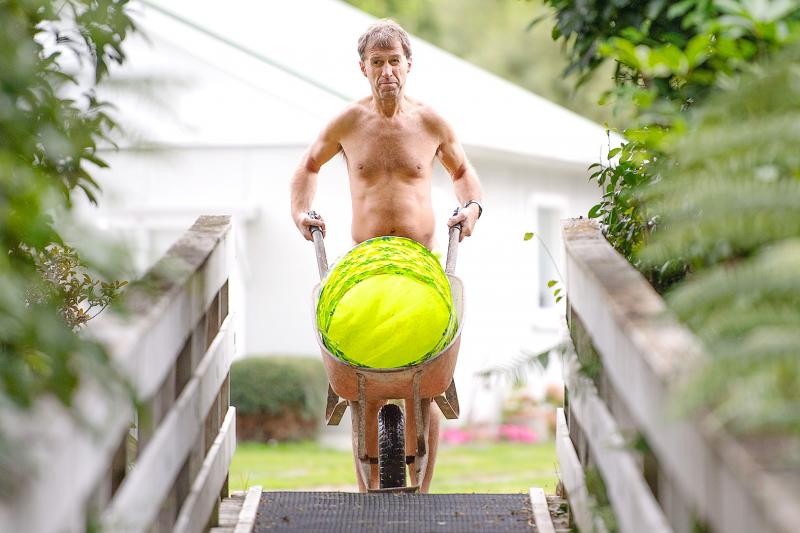With a growing body of research backing the idea that gardening can have measurable benefits to both mental and physical health, barely a week goes by in the horticultural press without a story on the positive impact it can have. As a geeky scientist, however, I wanted to know what it is specifically about growing plants that has this effect — and if we can answer this question could we make gardening an even more effective therapeutic exercise?
Put people on treadmills in front of screens projecting different views and those looking at green environments felt the exercise to be easier, had improved mood and better self-esteem than those without a view. However, when similar exercise experiments were run showing the same view either in black and white or with a red filter, they did not show the same benefits as those with the predominantly green view.
In theory this could mean simply that growing more evergreen plants could help boost the therapeutic efficacy of gardening. Does it have to be plants at all? Could just painting fences green have this effect? Or — dare I say it — would plastic plants trigger a similar response?

Photo: AFP
Well, research has shown that mindfulness exercises that focus one’s attention on the here and now and stop our minds wandering to the past or worrying about the future are an important therapeutic tool.
Gardening is a classic example of such a mindfulness exercise, where you clear out extraneous thoughts and focus on what is in front of you, especially given the seasonal nature of gardening. In fact, many Eastern cultures that have a long tradition of mindfulness are fixated on the beauty of seasonal plants, such as cherry blossom, precisely because of their transience, not in spite of it. So fake plants and a green fence are unlikely to provide the full benefit.
Likewise, it is often said that one of the key benefits of gardening has to do with the social interactions it can foster and that, good for you though all that greenery can be, it’s people that matter.
Indeed, studies conducted at community gardens found that gardening in such places has a significant positive impact on one of the key factors behind poor mental health — loneliness and isolation. One easy way to do this is to put more time and energy into your front garden. I have found that gardening like this instantly starts more conversations with neighbors, though, for introverts like me, chatting with half a dozen strangers a day does not always come naturally (even given the benefit of all the green plants).
It seems that attempting to isolate the benefits of horticulture down to a scientific set of instructions is far trickier than one might think. Each of these benefits appears to play only a small part in a much more complex puzzle, and the relative importance of each piece is likely to vary enormously for each person, to the point where they are often contradictory. When it comes to horticultural therapy, the best advice is it doesn’t matter how you do it, just do it the way that works best for you.

In the next few months tough decisions will need to be made by the Taiwan People’s Party (TPP) and their pan-blue allies in the Chinese Nationalist Party (KMT). It will reveal just how real their alliance is with actual power at stake. Party founder Ko Wen-je (柯文哲) faced these tough questions, which we explored in part one of this series, “Ko Wen-je, the KMT’s prickly ally,” (Aug. 16, page 12). Ko was open to cooperation, but on his terms. He openly fretted about being “swallowed up” by the KMT, and was keenly aware of the experience of the People’s First Party

Not long into Mistress Dispeller, a quietly jaw-dropping new documentary from director Elizabeth Lo, the film’s eponymous character lays out her thesis for ridding marriages of troublesome extra lovers. “When someone becomes a mistress,” she says, “it’s because they feel they don’t deserve complete love. She’s the one who needs our help the most.” Wang Zhenxi, a mistress dispeller based in north-central China’s Henan province, is one of a growing number of self-styled professionals who earn a living by intervening in people’s marriages — to “dispel” them of intruders. “I was looking for a love story set in China,” says Lo,

Aug. 25 to Aug. 31 Although Mr. Lin (林) had been married to his Japanese wife for a decade, their union was never legally recognized — and even their daughter was officially deemed illegitimate. During the first half of Japanese rule in Taiwan, only marriages between Japanese men and Taiwanese women were valid, unless the Taiwanese husband formally joined a Japanese household. In 1920, Lin took his frustrations directly to the Ministry of Home Affairs: “Since Japan took possession of Taiwan, we have obeyed the government’s directives and committed ourselves to breaking old Qing-era customs. Yet ... our marriages remain unrecognized,

It was on his honeymoon in Kuala Lumpur, looking out of his hotel window at the silvery points of the world’s tallest twin skyscrapers, that Frank decided it was time to become taller. He had recently confessed to his new wife how much his height had bothered him since he was a teenager. As a man dedicated to self-improvement, Frank wanted to take action. He picked up the phone, called a clinic in Turkey that specializes in leg lengthening surgery — and made a booking. “I had a lot of second thoughts — at the end of the day, someone’s going